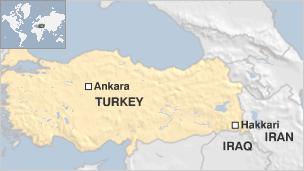Row erupts after nine die in south-east Turkish bomb
- Published
Nine people have been killed and four injured by a roadside bomb attack on a minibus in south-east Turkey.
Turkish Prime Minister Recep Tayyip Erdogan condemned the "terrorists" behind the attack - implicitly blaming the Kurdish rebel PKK.
Fighting between the government and PKK has escalated recently. But the group declared a ceasefire last month which is not due to end until next week.
The PKK denied planting the bomb, blaming groups loyal to the government.
The blast happened near the city of Hakkari, bordering Iran and Iraq, where Kurdish rebels have been active.
The civilian minibus was passing through the village of Gecitli and the passengers are believed to have been villagers.
The wounded included a 15-month-old baby.
Denial
Hakkari regional Governor Muammer Turker said Turkish troops were hunting those believed to be behind the attack.
Prime Minister Erdogan said: "These kinds of incidents will not deter us. Terrorism has a cost but it will not remain unanswered."
The PKK, designated a terrorist organisation by Turkey, the EU and the US, has waged a 26-year insurgency against the Turkish state which has claimed 40,000 lives.

A ceasefire it declared in August is not due to expire until 20 September.
The ceasefire followed a period of violence between the rebels and the military, which had escalated since the PKK called off a previous truce in June.
The rebels suggested the attack may have been the work of state forces.
"We have nothing to do with this explosion and we do not target civilians," Roj Welat, a spokesman for the PKK, told the Associated Press.
"The Turkish government and the groups loyal to it are behind these attacks as part of their attempts to distort the image of the PKK," he said.
Such allegations of black operations by the military to discredit the insurgents are commonplace in the south-east, said the BBC's Jonathan Head in Istanbul.
Proper investigations of such allegations are very rare, he added.
Autonomy call
In an interview for Spanish newspaper El Mundo earlier this week, PKK leader Murat Karayilan said the group would accept autonomous status for the Kurdish region like that possessed by Catalonia in Spain.
Catalonia has its own police force and parliament.
"If we obtain a Catalonia[-style] autonomy, we would lay down our weapons and hand them over to the United Nations," he was quoted as saying.
The PKK leader added that the group's strategy depended on whether or not Turkey continued "attacks and detentions of Kurds".
- Published21 July 2010
- Published3 July 2010